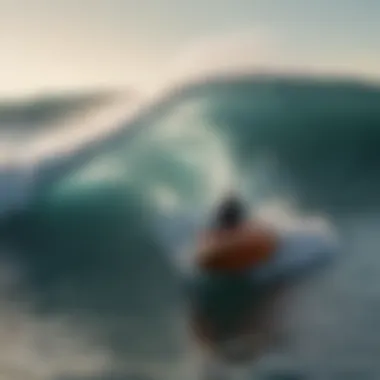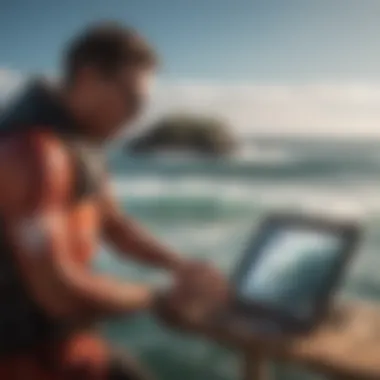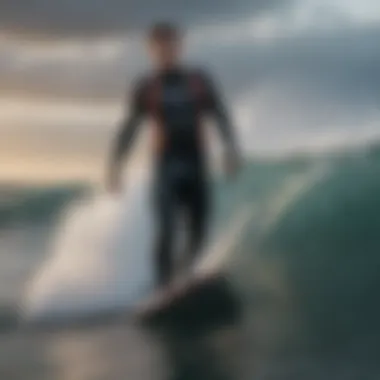Mastering the Art of Ocean Swell Forecasts: A Complete Guide for Water Enthusiasts


Water Activity Overview
When delving into the world of ocean swell forecasting, it is essential to understand how different water activities are impacted by varying swell conditions. Surfing, a popular water sport embraced by many thrill-seekers, heavily relies on optimal swell patterns to produce the perfect waves for riding. Sailing enthusiasts, on the other hand, navigate the waters aided by swell forecasts to ensure smooth sailing and enjoyable journeys. For snorkelers, calm swells are ideal for crystal-clear underwater visibility, enhancing their marine experiences. Paddleboarding aficionados seek moderate swells that add an element of fun and challenge to their adventures on the water.
Tips and Techniques
Tips for Beginners
For beginners eager to venture into the realm of water sports, understanding ocean swell forecasts can be a game-changer. Start by familiarizing yourself with basic swell terminologies such as wave height, period, and direction. These fundamental concepts lay the groundwork for interpreting forecast data accurately. As you progress, practice correlating the forecasted swell conditions with your intended water activity to optimize your experience. Embrace learning from seasoned enthusiasts and meteorological resources to sharpen your forecasting skills.
Advanced Techniques for Experienced Enthusiasts
Seasoned water sports enthusiasts often seek advanced techniques to harness the power of ocean swells effectively. Dive deeper into interpreting complex swell models, which provide in-depth insights into wave behavior and variability. Utilize real-time buoy data and satellite imagery to track developing swells and make informed decisions while planning your water escapades. Experiment with different forecasting tools and methodologies to refine your predictive abilities and stay ahead of evolving swell patterns for an enhanced sporting experience.
Safety Guidelines
Amidst the excitement of water sports, safety should always remain a top priority. Familiarize yourself with safety protocols specific to your chosen activity and location. Prioritize wearing appropriate safety gear, such as life jackets and helmets, to minimize risks while enjoying your water adventures. Stay informed about changing weather conditions and heed any warnings or advisories issued by relevant authorities. Regularly assess your skill level and the environmental factors to make sound judgments that prioritize your well-being and that of fellow enthusiasts.
Gear Reviews
Surfboards
Choosing the right surfboard can transform your surfing experience. Consider factors such as board length, volume, and fin setup to match your skill level and wave conditions. Opt for epoxy or fiberglass boards for durability and performance.
Sailboats
Sailboat enthusiasts rely on well-maintained vessels for smooth sailing journeys. Invest in quality sails, rigging equipment, and navigation tools to enhance your sailing adventures. Regular maintenance and inspections ensure your sailboat is always ready to navigate diverse swell conditions.
Snorkeling Equipment
Selecting the correct snorkeling equipment is crucial for an enjoyable underwater experience. Invest in high-quality masks, snorkels, and fins that provide comfort, durability, and optimal functionality for extended snorkeling sessions. Ensure proper fit and functionality for a seamless exploration of underwater wonders.
Paddleboards
Paddleboarding enthusiasts should choose boards that balance stability and maneuverability. Consider inflatable options for portability and storage convenience. Opt for paddles that are adjustable and lightweight, allowing for smooth strokes and efficient navigation through varying water conditions.
Wetsuits
Invest in wetsuits that offer insulation and mobility for prolonged water activities. Choose thickness and material based on water temperature and personal comfort preferences. Ensure a proper fit to maximize warmth retention and flexibility while engaging in water sports.
Destination Guides
Popular Water Sports Locations
Discover renowned water sports destinations around the globe that cater to enthusiasts of all levels. From iconic surfing beaches to picturesque snorkeling spots, these destinations offer diverse experiences in breathtaking natural settings. Explore world-class facilities and services tailored to elevate your water sports adventures.
Hidden Gems for Water Enthusiasts
Embark on a journey off the beaten path to uncover hidden gems ideal for immersive water sports experiences. Seek secluded coves, tranquil lakes, or offshore reefs that offer unique settings for snorkeling, surfing, sailing, or paddleboarding. Embrace the serenity and unspoiled beauty of less-explored locations for unforgettable water escapades.
Travel Tips for Water Sports Trips
Prepare for your water sports trips with strategic travel tips to make the most of your adventures. Pack essential gear, including sunscreen, hydration packs, and waterproof bags, to ensure comfort and convenience during your excursions. Research local regulations, weather conditions, and seasonal patterns to plan your trips efficiently and experience seamless water sport activities.


Introduction
Ocean swell forecasting is a crucial aspect for watersports enthusiasts, providing valuable insights into wave behavior and conditions. Understanding the intricacies of swell patterns allows enthusiasts to plan their water adventures with precision. This article delves into the nuanced world of ocean swell forecasting, equipping readers with the knowledge and skills necessary to make informed decisions based on swell data.
Understanding Ocean Swell Forecast
What is Ocean Swell?
Ocean swell refers to the long-period waves that travel outward from the area where they were generated. These waves exhibit smooth and regular motion that is distinct from wind-generated waves. The consistency of ocean swell makes it an ideal indicator of wave conditions for watersports enthusiasts. By comprehending the characteristics and behaviors of ocean swell, enthusiasts can anticipate wave patterns, improving safety and surf experience.
Importance of Swell Forecasting
Efficient swell forecasting is paramount for watersports enthusiasts as it aids in assessing surf conditions, wave quality, and overall safety. Reliable swell forecasting empowers enthusiasts to select the most suitable spots and time for water activities, optimizing the adventure. With precise swell forecasting, enthusiasts can avoid hazardous conditions and make the most of their time in the water.
Fundamentals of Swell Analysis
Swell Period
Swell period refers to the time interval between two successive waves passing through a fixed point. Understanding swell period is crucial as it influences wave energy and behavior. Longer swell periods indicate higher wave energy, producing powerful and consistent waves favored by experienced surfers. By analyzing swell period, enthusiasts can gauge wave intensity and choose appropriate locations for their watersports activities.
Swell Direction
Swell direction conveys the orientation from which waves are approaching a coastline. Knowledge of swell direction enables enthusiasts to identify the best surf breaks and anticipate wave behavior. Different coastlines interact uniquely with swell directions, creating varying wave shapes and sizes. By analyzing swell direction, enthusiasts can select spots that match their skill level and desired surfing experience.
Swell Height
Swell height denotes the vertical amplitude of waves from trough to crest. Wave height impacts wave speed, power, and suitability for different water activities. High swell heights typically result in more challenging surf conditions, requiring advanced skills for navigation. By evaluating swell height, enthusiasts can determine wave intensity and choose activities that align with their expertise.
Tools and Resources
Online Forecasting Websites
Online forecasting websites offer comprehensive data and analysis tools for assessing wave conditions and trends. These platforms provide real-time updates, historical data, and predictive models to aid enthusiasts in planning their water adventures effectively. By utilizing online forecasting websites, enthusiasts can stay informed about changing wave patterns and make informed decisions for their activities.
Mobile Applications
Mobile applications offer convenient access to swell forecasts, wave models, and interactive maps, enabling enthusiasts to stay updated on surf conditions while on the go. These apps often include customizable alerts and notifications, ensuring users are timely informed about favorable wave conditions. By leveraging mobile applications, enthusiasts can plan their water activities with flexibility and efficiency.
Local Resources
Local resources such as surf shops, beach patrols, and experienced surfers provide valuable insights and firsthand knowledge of specific surf spots. Local communities often have intimate knowledge of their coastline's unique characteristics and hidden gems, offering enthusiasts insider tips for enhanced surf experiences. By tapping into local resources, enthusiasts can gain valuable guidance and recommendations for maximizing their time in the water.
Interpreting Swell Data
In the vast realm of ocean swell forecasting, the crux lies in interpreting swell data accurately and effectively. Understanding how to decode the intricate patterns of swell behavior is paramount for watersports enthusiasts aiming to make the most of their aquatic pursuits. By delving into the depths of interpreting swell data, individuals can grasp essential information such as wave height, period, and direction, which are crucial elements in determining ideal surfing conditions. This section serves as a cornerstone for harnessing the power of ocean swell forecasts, offering insights that can elevate water sports experiences to new heights.
Wave Models
Global Wave Models
When examining the scope of swell forecasting, global wave models play a pivotal role in providing a comprehensive view of wave behavior on a larger scale. These models utilize advanced algorithms and data from various sources to generate forecasts that encapsulate a broader perspective of oceanic wave patterns. One of the key characteristics of global wave models is their ability to factor in different weather systems and ocean dynamics, enabling users to gain a holistic understanding of wave movements across vast geographical regions. Despite their extensive coverage and accuracy, global wave models may encounter limitations when predicting localized conditions due to their generalized approach.
Regional Wave Models


In contrast to global wave models, regional wave models focus on specific geographical areas, offering more localized and detailed predictions tailored to distinct coastlines and oceanic features. By honing in on smaller regions, these models can provide water sports enthusiasts with highly precise information regarding wave behavior, including intricate changes influenced by coastal topography and weather patterns. The key advantage of regional wave models lies in their ability to offer granular insights that are particularly valuable for surfers seeking optimal surfing conditions in specific coastal areas. However, the drawback of regional models may arise when attempting to forecast wave behavior on a broader scale, where global models excel.
Swell Forecast Metrics
Wave Height
Among the essential swell forecast metrics, wave height stands as a fundamental parameter that dictates the intensity and suitability of surfing conditions. This metric signifies the vertical distance between the crest and trough of a wave, indicating its magnitude and power. Understanding wave height is crucial for surfers as it determines the level of challenge and thrill they can expect during a surfing session. While higher wave heights may appeal to more experienced surfers seeking adrenaline-pumping rides, beginners often prefer gentler waves to hone their skills.
Wave Period
Wave period, another critical metric in swell forecasting, refers to the time interval between successive wave crests passing through a fixed point. This metric influences the pace and rhythm of waves, offering valuable insights into wave behavior and surfing conditions. Surfers often look for an optimal wave period that aligns with their surfing style and skill level, as shorter wave periods may result in rapid waves suited for high-performance maneuvers, while longer wave periods are favored for smoother, more consistent rides.
Wave Direction
Wave direction plays a vital role in determining the approach angle of waves toward a surf spot, influencing the quality and shape of waves for surfing. Surfers rely on wave direction to position themselves strategically in the lineup and catch waves effectively. By analyzing wave direction, surfers can anticipate wave breaks, plan their maneuvers, and maximize their surfing experience. Understanding the nuances of wave direction is essential for watersports enthusiasts seeking to optimize their time on the water and make the most of every wave.
Reading Buoy Data
Buoy Network
In the realm of ocean swell forecasting, buoys serve as invaluable assets for gathering real-time data on wave conditions and trends. The buoy network comprises a series of strategically positioned floating devices equipped with sensors that measure various parameters such as wave height, period, and direction. By tapping into buoy data, water sports enthusiasts can access up-to-date information that aids in making informed decisions about surfing locations and session timing. The buoy network enhances the accuracy and reliability of swell forecasts, empowering surfers to optimize their surfing experience while ensuring safety and enjoyment.
Interpreting Buoy Readings
Interpreting buoy readings is a skill that distinguishes seasoned surfers from novices, as it involves deciphering complex data to glean valuable insights about wave conditions. By analyzing buoy readings, surfers can anticipate wave patterns, trends, and potential hazards, facilitating strategic decision-making before heading out into the water. Understanding how to interpret buoy data empowers surfers to navigate diverse wave conditions, select suitable surfing spots, and tailor their approach based on real-time information. Mastery of interpreting buoy readings is a valuable asset for watersports enthusiasts looking to enhance their surfing proficiency and maximize their time on the waves.
Advanced Forecasting Techniques
When delving into the intricacies of ocean swell forecasting, it becomes paramount to explore advanced forecasting techniques. These techniques are the cornerstone of accurate and reliable predictions, providing watersports enthusiasts with invaluable insights into optimal wave conditions. By analyzing complex relationships between various factors influencing swell patterns, such as wind and topographic effects, individuals can gain a competitive edge in selecting the ideal surfing or sailing locations. Furthermore, understanding advanced forecasting methods elevates safety considerations by enabling enthusiasts to navigate potential risks effectively and make informed decisions during water sports activities. For an in-depth exploration of advanced forecasting techniques, our guide offers a comprehensive breakdown of these crucial methodologies, ensuring a thorough grasp of the nuances involved in ocean swell prediction.
Wind and Swell Interaction
- Wind Effect on Swell
Wind Effect on Swell
Exploring the dynamic interplay between wind and ocean swell is fundamental in mastering wave forecasting. The wind's influence on swell formation is profound, dictating wave height, period, and direction. Understanding how wind propagates energy onto the water surface allows enthusiasts to anticipate wave behavior accurately, optimizing surfing or sailing experiences. By dissecting the intricacies of wind effect on swell through empirical data and meteorological insights, individuals can harness this knowledge to navigate varying sea conditions with finesse and expertise, solidifying their command over the water realm.
- Swell Generation Mechanisms
Swell Generation Mechanisms
Delving into the mechanisms underpinning swell generation unveils a tapestry of complex processes shaping wave dynamics. From distant storms churning vast ocean expanses to local wind conditions sculpting waves near coastlines, the genesis of swells is a multifaceted journey. By decoding the unique features of swell generation mechanisms, enthusiasts can leverage this information to interpret wave forecasts more effectively, optimizing their water sports engagements. Recognizing the advantages and limitations of different generation mechanisms empowers individuals to adapt swiftly to changing environmental factors, ensuring a seamless integration of theoretical knowledge and practical application in their pursuit of mastering ocean swell forecasting.
Topographic Effects
- Coastal Features Influence
Coastal Features Influence
Coastal terrains wield a transformative influence on wave behavior, molding swells into diverse shapes and sizes as they approach shorelines. Tidal characteristics, seabed topography, and coastal structures collectively contribute to shaping local wave patterns, presenting enthusiasts with a mosaic of surfing conditions to navigate. By unraveling the nuances of coastal features' influence on swell dynamics, individuals can decipher the optimal strategies for maximizing wave-riding experiences. Understanding the advantages and disadvantages inherent in coastal influences prepares watersports enthusiasts to adapt fluidly to ever-changing surfing landscapes, cultivating adaptability and expertise in their interactions with the marine environment.
- Shoaling and Refraction


Shoaling and Refraction
The phenomena of shoaling and refraction underscore the intricate ways in which waves interact with varying bathymetric conditions, offering insights into wave transformation near coastal regions. As waves encounter shallower waters, shoaling manifests as a rise in wave height and a compression of wave periods, altering surfing conditions significantly. Refraction further refines wave behavior by bending swells around submerged obstacles, creating localized wave breaks and favorable surfing zones. By comprehending the nuances of shoaling and refraction effects, water sports enthusiasts can strategize their surfing sessions intelligently, harnessing these phenomena to enhance their surfing prowess and adaptability in different marine environments.
Seasonal Variations
- Understanding Seasonal Trends
Understanding Seasonal Trends
Dissecting the seasonal ebbs and flows of wave patterns illuminates the cyclical nature of swell behavior, unveiling recurring trends that shape water sports conditions across different times of the year. From summer swells heralded by tropical weather systems to winter waves driven by potent storm surges, understanding seasonal variations equips enthusiasts with foresight into optimal surfing periods. By discerning the unique features of seasonal trends, individuals can align their water sports activities with nature's rhythms, exploiting favorable conditions to elevate their surfing experiences. Moreover, recognizing the advantages and disadvantages inherent in seasonal variations empowers watersports enthusiasts to make informed decisions regarding their surfing endeavors, capitalizing on seasonal nuances to enrich their connection with the marine environment.
- El Niño and La Niña Impact
El Niño and La Niña Impact
The phenomena of El Niño and La Niña exert a profound influence on global weather patterns, cascading ripple effects on oceanic conditions and swell behavior. With El Niño heralding warmer sea surface temperatures and altered atmospheric circulations, and La Niña ushering in cooler oceanic conditions, these climatic events fundamentally transform wave dynamics worldwide. By unraveling the key characteristics of El Niño and La Niña impacts on swell generation, enthusiasts can anticipate the unique wave behaviors associated with these phenomena, offering invaluable insights into optimal surfing conditions during varying oceanic cycles. Understanding the advantages and disadvantages of El Niño and La Niña impacts enables watersports enthusiasts to navigate the complexities of global weather phenomena intelligently, adapting their surfing strategies to capitalize on these distinctive climatic patterns and enhance their water sports experiences.
Practical Applications
In the sphere of watersports, the section designated for Practical Applications plays an integral role in enabling enthusiasts to harness the principles of ocean swell forecasting effectively. Overlapping with other sections of this comprehensive guide, the context illuminated within the Practical Applications segment serves as a bridge from theoretical understanding to real-world implementation. By focusing on the tangible benefits and actionable insights drawn from swell data interpretation, Practical Applications cater to the core needs of water sports aficionados seeking to capitalize on predictive modeling insights for optimized decision-making. Thus, the Practical Applications segment stands as a crucial cornerstone in the edifice of mastering ocean swell forecasting.
Planning Surf Sessions
Choosing the Right Spot
Choosing the Right Spot emerges as a pivotal consideration within the framework of planning surf sessions. This aspect delves into the meticulous evaluation of geographical factors such as the topography of the shoreline, prevailing wind patterns, and the configuration of the seabed. By pinpointing optimal locations that exhibit conducive wave behavior and access to desired swells, individuals can maximize their surfing experiences while minimizing potential risks. The unique advantage of strategic spot selection lies in its ability to enhance surfing performance and safety, thereby rendering it a popular inclusion within the domain of mastering ocean swell forecasting.
Optimal Timing
When it comes to Optimal Timing, precision is key in orchestrating successful surf sessions. This aspect underscores the significance of synchronizing one's surfing ventures with optimal conditions such as tidal patterns, wind shifts, and peak swell periods. By aligning surfing activities with favorable timing windows, enthusiasts can capitalize on enhanced wave quality and reduced overcrowding, fostering a more enriching surfing encounter. The inherent advantage of timing optimization lies in its capacity to elevate overall surfing satisfaction and performance levels, positioning it as a favored practice within the spectrum of ocean swell forecasting mastery.
Safety Considerations
Living up to its title, Safety Considerations encapsulates prudent measures essential for safeguarding individuals engaged in water sports pursuits. Addressing critical facets like Rip Current Awareness, this subsection sheds light on identifying and navigating potential hazards plaguing coastal waters. By emphasizing the importance of recognizing rip currents' telltale signs and executing prompt responses, water sports enthusiasts can mitigate the dangers posed by these powerful oceanic phenomena. The advantageous trait of rip current awareness lies in its role as a life-saving skill, making it a pivotal inclusion within the annals of mastering ocean swell forecasting.
Surf Etiquette
Surf Etiquette emerges as a crucial component underscoring the sociocultural aspects of watersports engagement. This segment delves into the principle of mutual respect among surfers, emphasizing courteous behaviors like right-of-way acknowledgment, lineup dynamics, and environmental preservation. By upholding these unwritten codes of conduct, individuals contribute to fostering a harmonious surfing environment that enhances safety and camaraderie within the water sports community. The advantageous quality of surf etiquette lies in its role as a unifying force that promotes enjoyable and inclusive surfing experiences, solidifying its relevance in the realm of mastering ocean swell forecasting.
Competitive Edge
When the pursuit of excellence defines one's watersports journey, the Competitive Edge segment emerges as a strategic ally in maximizing performance outcomes. By leveraging Utilizing Swell Data for Competitions, athletes can gain a strategic advantage by harnessing cutting-edge analytics to inform their competitive strategies. This tactical approach allows competitors to make data-driven decisions, optimize wave selection, and capitalize on prevailing conditions to outperform adversaries. The unique feature of utilizing swell data for competitions lies in its capacity to augment performance precision and strategic acumen, cementing its status as a preferred tactic within the arsenal of mastering ocean swell forecasting.
Tactical Decision Making
Tactical Decision Making stands as a linchpin in shaping competitive outcomes through informed choices and calculated risks. This aspect equips athletes with the tools to analyze dynamic on-the-wave scenarios, adjust strategy on the fly, and capitalize on fleeting opportunities. By cultivating a keen sense of situational awareness and adaptive decision-making prowess, individuals can navigate challenging surf conditions with confidence and agility. The inherent advantage of tactical decision-making lies in its capacity to elevate performance resilience and competitive adaptability, solidifying its stature as a pivotal skill set within the realm of mastering ocean swell forecasting.
Conclusion
Navigating the tumultuous waters of ocean swell forecasting is not merely about predicting wave patterns, but rather a holistic understanding of the dynamic relationship between the ocean and the atmosphere. In this ultimate section of our comprehensive guide to mastering ocean swell forecasting for watersports enthusiasts, we underscore the pivotal essence of drawing conclusions from the plethora of data and insights shared throughout this informational journey. The nexus between theory and practical applications is delicately woven in the conclusions drawn, emphasizing critical nuances that can elevate one's water sports exploits tenfold.
Mastering Swell Forecasting
Continuous Learning
Embarking on a voyage towards mastering ocean swell forecasting entails an unquenchable thirst for knowledge and a perpetual inclination towards growth. The essence of continuous learning lies in its unrivaled ability to keep enthusiasts abreast of the latest trends, techniques, and advancements in the realm of oceanic forecasting. Devouring every nugget of information presented in this guide empowers water sports aficionados to stay ahead of the curve, optimizing their decision-making processes and honing their predictive skills with each passing wave.
Experience Integration
Integrating past experiences takes the art of ocean swell forecasting to unparalleled heights, transforming raw data into invaluable wisdom. By fusing theoretical insights with practical encounters, water sports enthusiasts can not only grasp the intricacies of wave dynamics but also internalize them on a visceral level. The amalgamation of knowledge and experience enriches one's forecasting acumen, providing a nuanced perspective that transcends mere statistical analysis and delves into the realm of intuitive anticipation. However, balancing accumulated experiences with contemporary data streams is paramount to avoiding cognitive biases and ensuring the reliability of forecasting outcomes.















